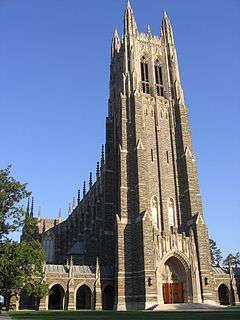Sanford School of Public Policy
Parent institution | Duke University |
|---|---|
| Named for | Terry Sanford |
| Programs | Government, leadership, ethics, journalism |
| Affiliations | APSIA |
| Website | www.sanford.duke.edu |
| Sanford School of Public Policy building | |
|---|---|
 | |
| General information | |
| Architectural style | Modern Gothic |
| Location | West Campus, Duke University |
| Named for | Terry Sanford |
| Completed | 1994 |
| Design and construction | |
| Architect | Architectural Resources Cambridge, Inc. |
The Sanford School of Public Policy at Duke University is named after former Duke president and Governor of North Carolina Terry Sanford, who established the university's Institute for Policy Sciences and Public Affairs in 1971 as an interdisciplinary program geared toward training future leaders. When the School's current building on Duke's West Campus opened in 1994, the structure was named—and the Institute renamed—in honor of Sanford. The Sanford School offers bachelor's, master's, and doctoral programs in Public Policy.
A second building, named for principal benefactor David Rubenstein, opened in August 2005. The building houses several of the school's centers including the Duke Center for Child and Family Policy and the Duke Center for International Development. Rubenstein Hall had its formal dedication, which included a speech by former U.S. Secretary of State Colin Powell on November 4, 2005.
The Institute officially became Duke's tenth school on July 1, 2009, when it was renamed the Sanford School of Public Policy.[1] The current dean of the Sanford School is Kelly D. Brownell.
Academic programs
Undergraduate
Sanford offers an undergraduate major in Public Policy Studies. The undergraduate program was slightly altered starting with the class of 2009. The department also recently instituted several "pathways", or groups of classes focused on one aspect of public policy. One aspect of the program that is unique among Duke's undergraduate majors is the requirement of a public policy-related summer internship.
The Institute also offers two undergraduate certificates: the Health Policy Certificate and the Policy Journalism and Media Studies Certificate.
Sanford also runs a study-abroad program at the University of Glasgow in Scotland. One notable aspect of the fall semester program is a four-day tour of London and its important cultural and political institutions and meetings with members of Parliament.
Graduate
At the graduate level, the School currently offers Master of Public Policy and Master of International Development Policy[2] degrees.
The program offers graduate level concentrations[3] in three major areas: Global Policy, Social Policy, and Health Policy.
The Ph.D program started in the fall of 2007.
Centers and Programs
The following centers and programs are affiliated with the Institute and/or operated by the Institute's faculty and staff.[4]
- The Duke University Center for Child and Family Policy
- The Center for Strategic Philanthropy and Civil Society
- The Duke Center for International Development
- Duke University Program on History, Public Policy and Social Change
- The DeWitt Wallace Center for Media and Democracy
- The Hart Leadership Program
- The Population, Policy and Aging Research Center (PPARC)
- The Program on Global Health and Technology Access
- The Samuel and Ronnie Heyman Center for Ethics
- Triangle Center on Terrorism and Homeland Security
- Triangle Institute for Security Studies
- The Center for the Study of Philanthropy and Voluntarism
- The United States – Southern Africa Center for Leadership and Public Values
- The Program on Civil Society (Fleishman Civil Society Fellows)
Rankings
Top ten specialities and overall graduate level public affairs program as ranked by US News & World Report in 2016:
- 3rd in Environmental Policy & Management
- 3rd in Health Policy & Management
- 4th in Public-Policy Analysis
- 5th in Social Policy
- 25th in Nonprofit Management
- 13th in overall graduate level public affairs program
References
- ↑ "Dean Talks About Transformation to Sanford School of Public Polcy". Duke University. Retrieved 2009-07-11.
- ↑ "MIDP Replaces PIDP". Retrieved 2009-07-16.
- ↑ "Concentration Areas". Retrieved 2012-06-13.
- ↑ http://www.pubpol.duke.edu/centersandprograms.html
